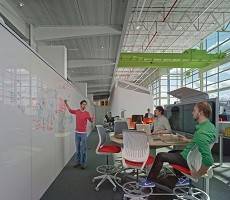November 3, 2014
More London convention one of highlights of Workplace Week, which starts today
Tours of Google, Mintel and Lloyds of London are just some of the highlights of Workplace Week, the annual week-long celebration of workplace innovation which starts today. Organised by AWA to raise money for Children in Need, the inaugural Workplace Week in 2009 happened after Andrew Mawson, AWA’s managing director, had the idea for a workplace-related event raising money for the charity. This year’s week includes a programme of 90 minute ‘working workplace’ tours involving some of the UK’s most innovative workplaces; including Google, Mintel, Innocent Drinks, BDO, Edelman, Lloyds of London, Guardian Newspapers, CBI, Invesco, Prostate Cancer, and PWC Embankment Place. The week will also feature a one-day convention at PWC’s More London office near London Bridge on Thursday 6 November entitled, ‘the Work/place Revolution….taking human performance to new levels’. The focus here will be on taking human performance to new levels, with a range of speakers offering case studies, insights and new research. (more…)



























October 29, 2014
The business case for green building widens to cover wellness and productivity
by Alison Kitchingman • Comment, Environment, Facilities management, Workplace design
(more…)